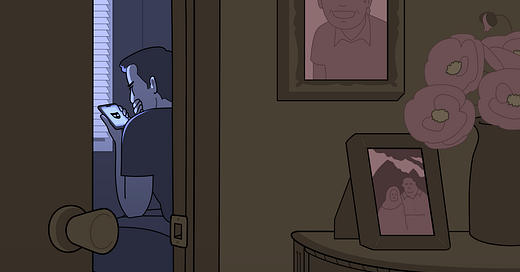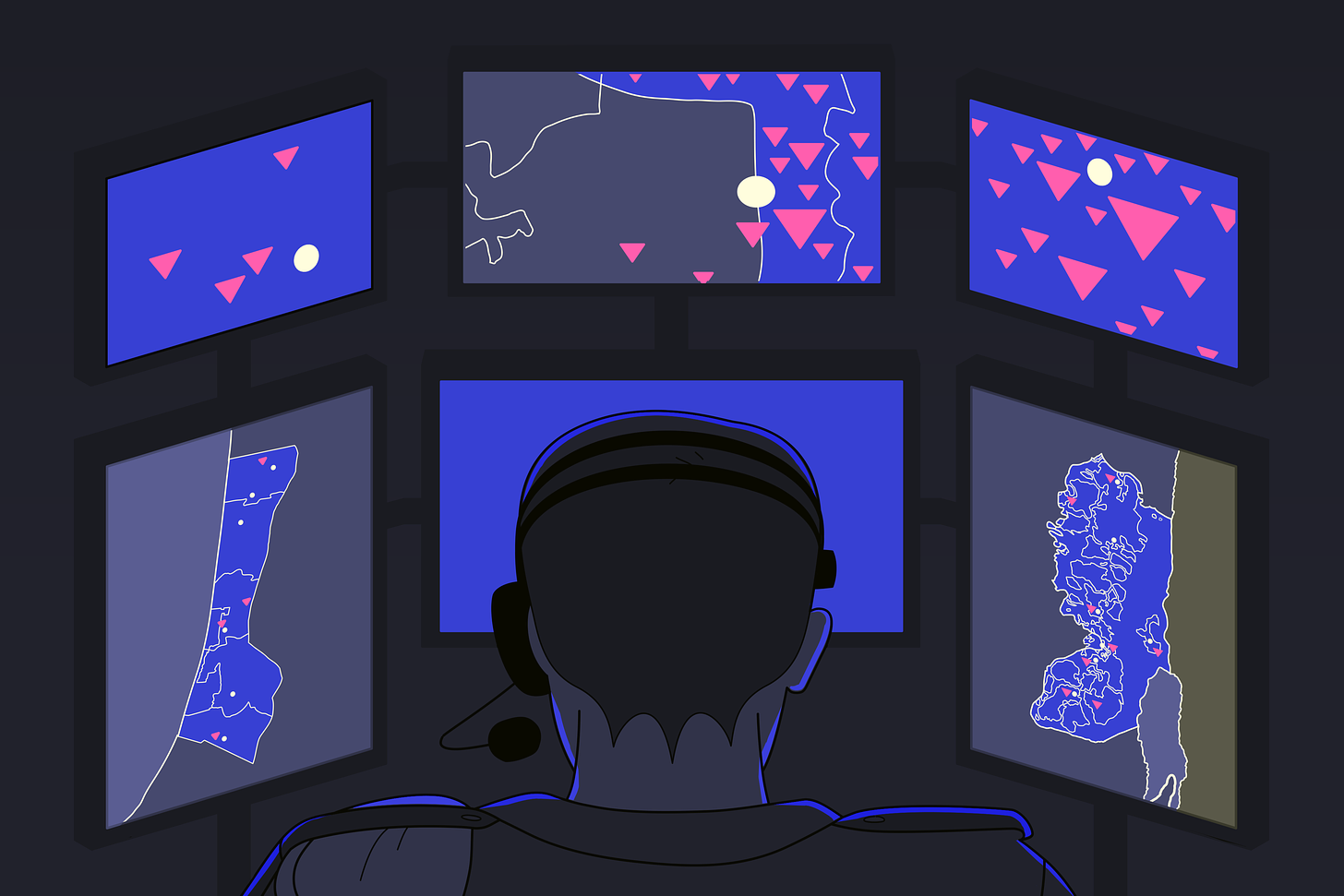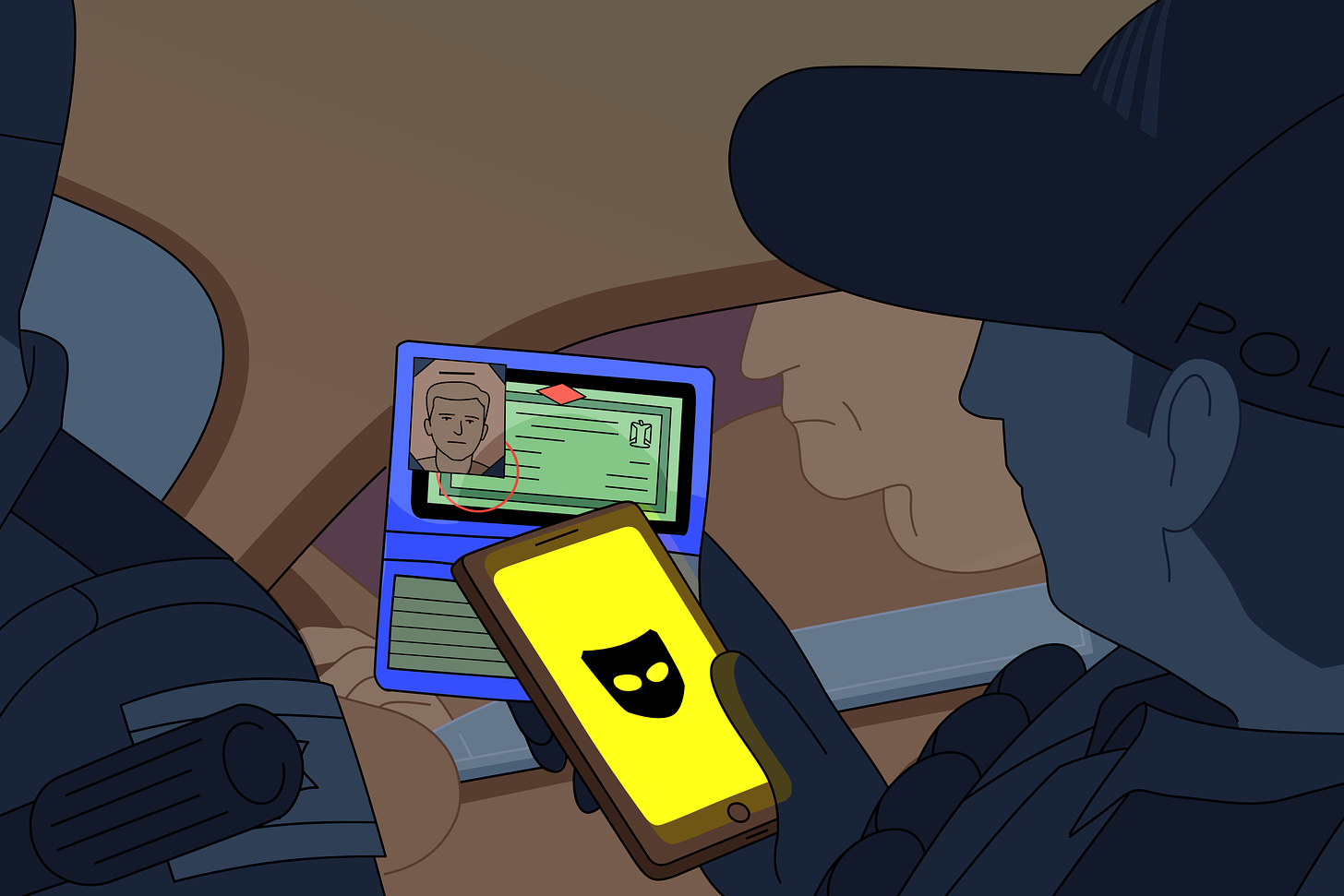How Israel's Elite Intelligence Unit Targets Queer Palestinians in the West Bank
A former intelligence official reveals the wide-ranging campaign to sow distrust across the West Bank.
In February, Adham, a 20-year-old Palestinian, was visiting his family’s home in the West Bank. One night while scrolling through Grindr, the gay messaging app, he received a message from an anonymous user “hey,” the user wrote, before “tapping,” the platform’s function for expressing interest. The user, like Adham’s, had a blank profile that included only minimal information about his interests and whereabouts, specifying only where he lived. (Drop Site News has changed his name to protect him from retaliation.)
They hit it off and were chatting for a few hours before Adham shared that he was a university student in the West Bank. That prompted the user to share his thoughts on several professors at the university who had recently drawn attention for voicing pro-Palestine views. “He wanted me to be disgusted by them,” Adham told Drop Site. “Why are you trying to convince me that this doctor is a bad person just because he's against the occupation? It feels weird at first. Just bizarre.” Adham chalked it up to a difference of opinion and the two continued to chat. Eventually Adham sent the user his number so they could message on WhatsApp.
Once the conversation moved off-platform, the user revealed his identity to Adham. “That’s when he said he worked with Israeli intelligence,” he said. Using Adham’s number, the user had identified him and began sending him messages with the names and photos of his family members he had found on their Facebook profiles. Adham hadn’t even shared his name with the user, much less anything that could point him to his family members—he’s not out to his family. “I started crying and I didn't know what to do,” Adham said.
Adham blocked the profile on Grindr, but soon began receiving SMS messages repeating the same threats. “It was a whole night from 12 to the sunrise,” Adham said. “He kept threatening me, saying he will expose me.”
The user told Adham he sought intelligence on Adham’s cousins who, at the time, were in an Israeli prison, awaiting trial on suspicion of their involvement with the al-Qassam brigades, Hamas’s military wing. “He told me that I should go to their homes, search and question their parents and get as much information about them as possible,” Adham recalled. “He said that you can't run away from us. We, you know where you live,” Adham said. “So I just get the SMS card, I throw it, I turned off my phone.”
In the morning, he checked his mother’s phone continuously to make sure she hadn’t received any messages. One of his friends had his Grindr chats and images sent to his friends and family after receiving similarly threatening messages from a user who claimed to be an Israeli intelligence official. Drop Site could not verify the messages to Adham came from an intelligence official. But a former official with Unit 8200, Israel’s signals-intelligence agency, confirmed the involvement of Shin Bet, Israel’s internal security agency. The Israel Defense Forces declined to comment.
In the wake of October 7, Israel has launched incursions into what many once saw as “bubbles of immunity” in the West Bank, according to one Palestinian. Checkpoints in and out of territory under Palestinian Authority jurisdiction that had been open before the war are now closed at whim. Life in the West Bank is still frozen in time—and in a perpetual state of grief. Nightclubs, the center of young and queer life in Ramallah, are still empty. The atmosphere of openness in Palestine’s city centers has faded as the daily death tolls in Gaza continue to rise.
Over the past several months I spoke with dozens of queer Palestinians who had encounters with Israeli intelligence. Many had received threatening messages via Grindr, Instagram, or Facebook from an anonymous individual who had their identifying information, forcing them to turn into informants. That, in turn, has sown suspicion across the West Bank and frayed trust.
“Israel's objective in the occupied Palestinian territory is control, domination, and subjugation,” said Jalal Abukhater, who works at 7amleh, a Palestinian digital security organization. Its larger goal, he said, “to instill fear in Palestinians, preventing them from acting or socializing naturally.”
“The only limit is resources”
In July, I met with a former high-ranking officer with Unit 8200, the Israeli intelligence service that primarily intercepts communications and monitors the whereabouts of persons of interest. Among Israelis, there is a “bubble of secrecy” that sustains the idea of Unit 8200 as only a defensive agency that targets terrorists, he said. In reality, it has a substantial role in cultivating informants across the West Bank. In effect, the former official’s job was to maintain a culture of fear and distrust across the West Bank. “There's no legal issues that you need to face. There's no legal consultation. Any 18-year-old can decide to put someone on surveillance,” he said. “The only limit is resources.”
Over much of his six years of service, the former official’s position gave him access to information on ordinary Palestinians in the West Bank used to blackmail them in exchange for intelligence on Unit 8200’s expansive list of targets. When a person-of-interest’s daughter had cancer, “you could help, or you could prevent this treatment that they might get,” he said, citing one example. An Israeli officer might say something like, ‘It would really be terrible, you know, if something happened and you won't reach that treatment on Monday. But on the other hand, I can make sure that you get that treatment.’ So the relationship develops.” Such methods – threatening to withhold services from a Palestinian unless they cooperate with Israeli authorities – violate international law, according to a 1994 report from B’Tselem, which also noted that Israel has forced tens of thousands of Palestinians to work as informants since 1967.
“Israel's objective in the occupied Palestinian territory is control, domination, and subjugation … to instill fear in Palestinians, preventing them from acting or socializing naturally.”
The former official said he and his colleagues were instructed to watch for Arabic words like “gay” and “affair” when monitoring communications of potential targets. “You write someone on Facebook or another application to create some connection. At first it has to look innocuous, so you start small, you start with something totally benign, and then you gradually kind of reach more and more and create a stronger relationship,” he said. “You also might bring up in some way or another that you know this person is gay. You don't have to threaten to create an explicit threat.”
In one case, Daniel, a Palestinian man who worked for the Catholic church, was threatened by an individual on Facebook who said he had evidence of his homosexuality. “we know that you are a f***** you disgrace Christianity and Palestinians with your disgusting nature and I will expose you for what you really are,” the user wrote. “I’m gonna tell the whole world that you are gay and that you are a danger to the children of this society. you are disgusting and you will never get anywhere because I will stop you,” he added. Daniel said the only way someone could have known of his sexuality is if they had monitored his search history. (Drop Site News has changed his name to protect him from retaliation.)
Over the decades, numerous investigations have exposed how Israeli intelligence targets LGBTQ+ people. In 2013, Vice published an investigation detailing how the Palestinian Authority’s preventative security forces, under the direction of the IDF, had isolated gay Palestinians from their communities, kept files on them, and exploited them for intelligence. In 2015, news reports revealed that a surveillance technology company run by a former Unit 8200 official had helped provide Uganda with malware allegedly used against LGBTQ+ activists.
“Israelis think we're targeting bad people—we're targeting terrorists—people who are violent, and that's also true,” the former Unit 8200 official said. “But if you want a second circle and third circle and a fourth circle, then anybody's a target. And if you can blackmail cooperation, then you want to try to assemble as much filth as possible.”
Forced collaboration
For queer Palestinians blackmailed by Israel, the impossible question before them is whether to risk being outed for their sexuality or for collaboration.
In July 2023, a man who calls himself Mohammed was driving from the West Bank to Jerusalem with a Palestinian man he had met on Grindr. While Mohammed has a Jerusalem ID that allows him to travel freely between the Occupied Territories and Israel, he must still pass through checkpoints upon entry and exit. When he arrived at the Al Jeeb checkpoint with his partner, he was stopped by an Israeli soldier who asked him to open his phone for a security check. Mohammed complied, telling the soldier, “You can check my car. You can check me. There's nothing,” he said. The soldier then turned to Mohammed and pointed to the Grindr icon. “No, you have this application here,” he said. “It's not good.”
For five hours, Mohammed and his partner were held in custody. An Israeli official scrolled through his chats and intimate pictures on Grindr and asked him about encounters with other Palestinians, Mohammed said. He asked Mohammed to work as a collaborator, offering him payments in shekels and promising not to arrest him. When Mohammed refused, Israeli soldiers beat him for two hours.
Mohammed’s account is consistent with what Abukhater described as common practice among Israeli soldiers: forcing Palestinians at checkpoints or on the street to unlock their phones to have their private messages and photos scrutinized. “Based on this information, they can detain, interrogate, or arrest Palestinians under the pretext of ‘consumption of terrorist material,’” a reference to articles about events in Gaza, he said.
After Mohammed and his partner were released, Mohammed was returned to his family’s home in Ramallah. His mother asked him what had happened. He’d gotten in a fight, he said, lying with good reason: He likely feared the very real repercussions from his community that those accused of collaboration – known in Arabic as “isqat,” or “the fall” -- have faced.
An Israeli official scrolled through his chats and intimate pictures on Grindr and asked him about encounters with other Palestinians. He asked Mohammed to work as a collaborator. When Mohammed refused, Israeli soldiers beat him for two hours.
In April 2023, Lions’ Den, an armed resistance group in the city of Nablus, publicly executed a young man named Zuhair al-Ghaleeth after allegations surfaced that he’d been an informant for Israel. In a forced confession published on Telegram by Lions’ Den, al-Ghaleeth said he had been intimate with another man on Grindr who he later learned worked for Israeli intelligence. The intelligence officer had blackmailed him with a sex tape, forcing him to share information on the whereabouts of Lions’ Den fighters. Drop Site could not independently verify al-Ghaleeth’s claims. Al-Ghaleeth’s killing sparked a debate across the West Bank, one Palestinian told me: How could he fear his family and community’s reaction to the truth of his sexuality more than the consequences of collaborating with the Israelis?
After October 7, such discussions ceased. Events in Gaza have left little room for reflection about how and why queer Palestinians can be blackmailed into collaboration with the Israelis. “You just want to create an atmosphere of terror, of snitches to weaken trust and confidence,” the former official said. “You want everybody to suspect everybody all the time. It serves the regime and destroys the society under control.”
In January 2024, the Tulkarm Brigade, a Palestinian militia group, executed a Palestinian man named Jamal Hafiz Jabri after he allegedly informed the Israelis of the whereabouts of their fighters, resulting in four deaths. In a forced confession similar to al-Ghaleeth’s, Jabri said an Israeli intelligence officer approached him under the guise of a sexual encounter. Across Palestine, both cases exacerbated the LGBTQ+ community’s fear that Israel’s intelligence operations would spur further hatred against them, for fear that they were susceptible to being turned into informants.
A “Safe Haven for Queers”
Such methods stand in stark contrast to Israel’s effort to cast itself as a safe haven for queers in the Middle East, while portraying Palestine as a homophobic backwater.
Following the attacks of October 7 and Israel’s war in Gaza, an image of an Israeli soldier hoisting a Pride flag above the rubble of Khan Younis went viral on Twitter. Critics described it as an example of “pinkwashing,” or when an institution deploys pro-LGBTQ+ messaging to distract from or paper over its unsavory actions. Prime Minister Benjamin Netanyahu has also mocked the pro-solidarity slogan “Gays for Gaza” as tantamount to “Chickens for KFC.”
Israeli officials often point to a British Mandate-era law that makes homosexual acts punishable by death in Palestine. But that law is not enforced.
“By contributing to the erasure of Palestinian bodies and voices, they contribute to the dehumanization of people in the West Bank and Gaza Strip—both queer and straight—and attempt to justify the hierarchy of lives that privileges Israelis over Palestinians,” said Sa’ed Atshan, an associate professor at Swarthmore College who studies gender and sexuality in Palestine.
In 2014, nearly two dozen Israeli intelligence officials published a letter declaring their refusal to complete their reserve service in the IDF over its violations of Palestinian rights in the West Bank. "The Palestinian population under military rule is completely exposed to espionage and surveillance by Israeli intelligence,” they wrote. “It is used for political persecution and to create divisions within Palestinian society by recruiting collaborators and driving parts of Palestinian society against itself."
Yet some prominent LGBTQ+ advocacy groups in Palestine pushed back. In response to the Unit 8200 letter, Al Qaws, a prominent LGBTQ+ group in Palestine, wrote that while blackmailing members of the community is a “naked act of oppression,” such targeting “is no more or less oppressive than blackmailing and extorting an individual on the basis of their lack of access to healthcare, disrupted freedom of movement, exposure of marital infidelities, finances, drug use, or anything else.” The former Israeli intelligence official confirmed that Palestinians could be targeted for a number of different vulnerabilities, including those listed in the Al Qaws letter.
Atshan said the Al Qaws response “sent activists into a crisis over whether they had ‘singled out’ sexuality in their activism and whether it is ever truly possible to properly contextualize everything that is happening to Palestinians.” On March 1, Israel incarcerated Omar al-Khatib, a Palestinian activist who formerly worked for al-Qaws who has written extensively on gender and sexuality in Palestine. He is being held without charge. In July, Israel extended al-Khatib’s administrative detention for four months.
“Crying and praying”
It took a few weeks of chatting on Grindr for Adham to agree to meet me in person. Eventually, he sent me his location on WhatsApp and asked me to meet him at his apartment building. Together, we drove to a nearby café. He still hesitated over whether to speak with me. Israel has arrested dozens of students at Birzeit University in the West Bank since October, and he hadn’t dismissed the possibility that I could be working for Israeli intelligence.
“I thought that something would happen to me that night,” he said, recalling his experience on Grindr. “They would come to arrest me. It’ll be published on YouTube” that he is gay, he said. “So I stayed awake that night, just crying and praying that nothing would happen.”
The next day, Adham asked his mother and father for their phones. He waited anxiously to see whether anyone would attempt to contact them or “out” him to the Palestinian community.
“Even though I'm going to be exposed and my family would know, I would rather experience this than going and betraying my family,” Adham said. “And so I told him that.” While the person didn’t follow through on his threats, Adham still worries that if his cousins were to be charged or put on trial, the person would again try to pressure him into collaborating.
Adham said he will have to live with the consequences of his choices. The world is finally paying attention to Israel’s crimes in Palestine, he said, a shift that brings him significant comfort.
“After the 7th of October, all of the world knows. The world is listening to what’s happening,” Mohammed said.









Thanks for exposing yet another level of cruelty by Israel.
“Such methods – threatening to withhold services from a Palestinian unless they cooperate with Israeli authorities – violate international law, according to a 1994 report from B’Tselem, which also noted that Israel has forced tens of thousands of Palestinians to work as informants since 1967”
And the State Department ghouls have the audacity to pretend this started on October 7th 🤬👊🏽🥺